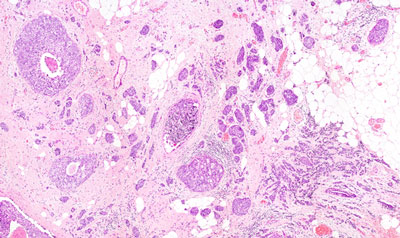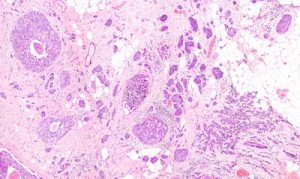Perjeta regimen helped people with HER2-positive early breast cancer live longer without their disease returning or getting worse compared to Herceptin and chemotherapy
Posted: 1 June 2015 |
Roche has announced new results from the Phase II NeoSphere study that assessed a Perjeta regimen in people with HER2-positive early breast cancer…


Roche has announced new results from the Phase II NeoSphere study. The study assessed a Perjeta® (pertuzumab) regimen in people with HER2-positive early breast cancer (eBC).


The results suggest that Perjeta in combination with Herceptin® (trastuzumab) and docetaxel chemotherapy given prior to surgery reduced the risk of disease getting worse and increased the time people lived without their cancer returning compared to Herceptin and chemotherapy.
The safety profile of the Perjeta regimen was consistent with that seen in previous studies, and no new safety signals were identified.
People treated with the Perjeta regimen were 40% less likely to experience disease recurrence
In the NeoSphere study, both progression-free survival (PFS) and disease-free survival (DFS) were evaluated at three years. The results suggest that people who received the Perjeta regimen prior to surgery were 31% less likely to experience disease worsening, recurrence or death compared to those who received Herceptin and chemotherapy. People treated with the Perjeta regimen were also 40% less likely to experience disease recurrence or death.
People in the NeoSphere study who were treated in the neoadjuvant setting also received a year of adjuvant treatment with Herceptin plus chemotherapy after their surgery. The results of this analysis are descriptive, as the study was not designed to show statistical significance for three-year PFS and DFS.
Treating breast cancer early may help prevent the disease from returning or reaching an advanced stage
“Treating breast cancer early, before it has spread, may help prevent the disease from returning or reaching an advanced stage,” said Sandra Horning, M.D., Roche’s Chief Medical Officer and Head, Global Product Development. “These new results add to the body of data for Perjeta in the neoadjuvant setting, and we look forward to the Phase III APHINITY study results to better understand the broader impact of Perjeta in the adjuvant treatment of HER2-positive early breast cancer.”
The results also suggest that people who achieved pathological complete response (pCR), i.e. had no tumour tissue detectable at the time of surgery in the affected breast and local lymph nodes, were more likely across all arms of the study to be alive and disease-free at three years, supporting the association between pCR and improvements in longer-term outcomes.
It was previously reported that the Perjeta regimen significantly increased the number of people who achieved pCR compared to Herceptin and docetaxel chemotherapy (39.3 vs. 21.5%). These new data suggest that this pCR benefit seen with the combination of Perjeta, Herceptin and chemotherapy may translate into longer-term improvements in patient outcomes.



